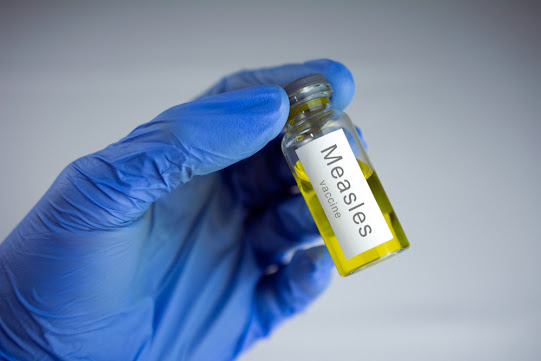Nearly 40 million children worldwide did not receive their full measles vaccination last year because of barriers brought on by the pandemic.
 |
| Measles Vaccine |
There is now an imminent threat of measles spreading in every region of the world, the World Health Organisation and the US public health agency has said.
According to the World Health Organization and the United States Public Health Service, measles poses a "imminent threat" in every part of the globe.
According to a report published jointly by many health groups, measles vaccination rates dropped and disease surveillance decreased during the COVID pandemic.
Immunization is highly effective against measles, one of the most contagious human viruses, but not quite enough on its own to avoid outbreaks, which require vaccination coverage of 95 percent or higher.
According to the data from the WHO and the US Centers for Disease Control and Prevention, a record-breaking number of roughly 40 million children missed a shot last year due to obstacles imposed by the pandemic.
Millions of teens are now at risk of contracting the disease because of this.
"We are at a crossroads," Patrick O'Connor, the WHO's measles lead, said.
"It is going to be a very challenging 12-24 months trying to mitigate this."
There hasn't been a dramatic increase in instances compared to last year, but now is the time to act, he added.
Mr. O'Connor speculated that the lack of an increase in cases may be due to the cyclical nature of measles as well as the lingering effects of social isolationism.
But because it is so viral, this might alter rapidly.
Officials estimate that there were nine million cases of measles last year, leading to around 128,000 fatalities.
England's vaccination rates hit a 10-year low in February, alarming health experts.
Measles can spread from person to person through casual touch or through the air via respiratory transmission (coughing, sneezing).
Unvaccinated young kids are at the highest risk of measles and its consequences.
Because it weakens the immune system, children who contract it are more likely to acquire secondary diseases like pneumonia or encephalitis.
Measles is an infectious disease that produces a rash on the face and upper neck, high fever, and occasionally death.
The majority of deaths (95%) and more occur in third world nations, mostly in Africa and Asia.
The measles vaccination, when given in two doses, is around 97% effective in preventing serious illness and death, but there is no particular therapy for the disease.





0 Comments